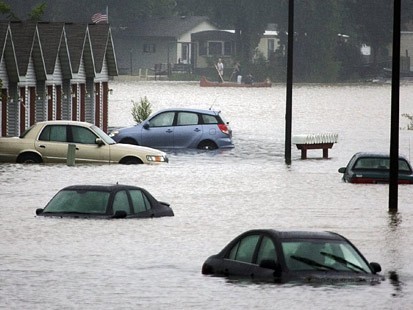A new study by scientists with the National Technical University in Athens, Greece, contradicts global warming alarmists’ claims that flooding is increasing worldwide. The new study bolsters previous studies showing no global increase in peak streamflows.
Studies Find No Increase
The Greek researchers presented a paper at the European Geosciences Union (EGU) earlier this year and concluded, “Analysis of trends and of aggregated time series on climatic (30-year) scale does not indicate consistent trends worldwide. Despite common perception, in general, the detected trends are more negative (less intense floods in most recent years) than positive.”
The new study confirms previous peer-reviewed studies finding little or no increase in flooding events as the planet has modestly warmed during the past century.
Scientists at the U.S. Geological Survey reported in a 1999 Geophysical Research Letters study that streamflow as a whole increased in the United States throughout the 20th century, but most of the increase occurred during low-flow and mid-flow events.
“Hydrologically, these results indicate that the conterminous U.S. is getting wetter, but less extreme,” the study concluded.
A U.S. Geological Survey study published in March 2006 in the peer-reviewed Journal of Hydrology similarly found more precipitation but little or no increase in flooding events.
A National Oceanic and Atmospheric Administration study published in April 2009 in the Journal of the American Water Resources Association reported streamflow trends are rising during low-flow seasons, but there is no increase during high-flow seasons.
Land Use Decisions Questioned
While flood events may not be increasing in frequency or intensity, the propensity of people to build in flood plains ensures flooding will remain a strong concern that will likely result in rising death tolls and property damage.
“The policies that make sense in response to floods and the threat of floods are well understood by the community of scholars and practitioners who deal with natural hazards. These lessons — such as building out of harm’s way, avoiding reliance on structural mitigation when possible, the importance of shared public-private responses (e.g., insurance regimes), sharing risk and avoiding moral hazard, appreciating uncertainties, making good use of forecasts — are pretty insensitive to specific scientific studies on flood trends,” Roger Pielke, Jr., professor of environmental studies at the University of Colorado at Boulder, told Environment & Climate News.
Media Changes Perceptions
Meteorologist Anthony Watts told Environment & Climate News greater access to media technology leads people to believe extreme weather events like flooding are increasing in frequency and intensity, even when no such increase occurs.
“In the 1960s through the 1980s, we relied on teletypes to disseminate the news. But in the 1980s things really started changing with the advent of satellite news. About 15 years later, the Internet began connecting everyone. The Internet was bigger than satellite TV because it was instantaneous and could reach everyone,” said Watts.
“When there’s a fire, hail storm, tornado or even a speck of dust falls somewhere, everyone hears about it,” Watts explained.
H. Sterling Burnett, a senior fellow with the National Center for Policy Analysis agrees.
“Just go back and look at any American paper a hundred years ago: Would there be stories about children starving Africa? No, because there would be no reporters there; for instance, the Dallas paper a hundred years ago wasn’t covering a tornado touching down in South Dakota. It just didn’t warrant inclusion in the paper and there were no reporters sent there to cover the event the way we do today,” explained Burnett.
Journalist Advocates
Adding to problem, Watts and Burnett observed, is many journalists have been corrupted by the idea of the ‘noble cause’ that justifies over-inflating global warming storylines.
“While some environmental journalists take the journalist part of their titles seriously, the fact that they are environmental journalists indicates the environment is something they have cared about. They don’t see conflicts of interest because it’s all in the pursuit of a good cause. Now we have a whole generation of journalists who are environmental advocates. They often check only with scientists whose views already match their preconception of the issue,” said Burnett.
Kenneth Artz ([email protected]) writes from Texas.





